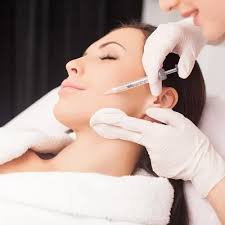Botox is one of the most popular non-surgical cosmetic treatments in the world today. Used primarily to smooth wrinkles and fine lines, Botox is widely praised for its quick results and minimal downtime. However, many people still ask: “Is Botox damaging to the skin?” It’s a valid concern, especially for those considering it for the first time or thinking about long-term use. In this article, we’ll break down what Botox is, how it works, and whether it causes any harm to the skin over time.
What is Botox?
Botox injection is the brand name for botulinum toxin type A, a neurotoxin produced by the bacterium Clostridium botulinum. While the term “toxin” sounds scary, Botox is used in extremely small, controlled doses to relax the facial muscles that cause dynamic wrinkles — like frown lines, crow’s feet, and forehead creases.
How Does Botox Work?
When injected into specific facial muscles, Botox blocks the nerve signals that cause those muscles to contract. As the muscles relax, the overlying skin becomes smoother, making wrinkles and fine lines less noticeable. The effects typically last 3 to 6 months, after which the muscle activity gradually returns, and wrinkles may reappear.
Is Botox Harmful to the Skin?
Now, let’s get to the big question — is Botox damaging to the skin? The short answer is: No, Botox does not directly damage the skin. In fact, many dermatologists believe it can actually have some positive effects on the skin over time. However, there are a few important details to consider.
✅ Benefits of Botox for the Skin
Botox can actually improve skin texture in the following ways:
1. Smooths Wrinkles
It helps reduce the appearance of fine lines and wrinkles, giving the skin a younger, more refreshed look.
2. Prevents Deep Wrinkles
With repeated use, Botox may help prevent deeper wrinkles from forming by limiting excessive facial movements.
3. Improved Skin Texture
Some studies suggest Botox can increase skin elasticity and hydration, especially when combined with other treatments like microneedling or fillers.
⚠️ Potential Risks and Side Effects
While Botox doesn’t damage the skin itself, improper use or poor technique can lead to temporary issues:
1. Bruising and Swelling
These are common side effects after injections but usually resolve within a few days.
2. Asymmetry
If Botox is not injected correctly, it may result in uneven facial expressions or drooping — a sign of muscle imbalance rather than skin damage.
3. Muscle Weakness
Repeated use in the same muscles can cause temporary weakness or thinning of the muscles, which might indirectly affect the appearance of the skin by making it look less firm.
4. "Frozen" Look
Too much Botox can create an unnatural or stiff appearance, but this is a dosage issue — not a sign of skin damage.
Does Long-Term Botox Use Harm the Skin?
One of the biggest concerns is whether repeated Botox use over several years can be harmful.
👉 The good news:
There is no clinical evidence that long-term Botox use causes skin thinning, discoloration, or damage.
In fact:
Many people who have used Botox for 10+ years report smoother skin and fewer deep-set wrinkles than their peers.
However, long-term users should be mindful of changing muscle dynamics and may need adjustments in their treatment plan over time.
Who Should Avoid Botox?
While Botox is generally safe for most adults, it may not be suitable for:
- Pregnant or breastfeeding women
- People with certain neuromuscular disorders
- Individuals with allergies to botulinum toxin ingredients
Always consult a board-certified dermatologist or plastic surgeon before starting Botox treatments.
Tips for Safe Botox Use
To get the best results without harming your skin, follow these expert tips:
- ✅ Choose a certified and experienced provider
- ✅ Start with small doses and increase gradually if needed
- ✅ Wait at least 3 months between treatments
- ✅ Avoid touching or massaging the area after injections
- ✅ Combine with a good skincare routine for optimal results
Botox Myths vs. Facts
MythFactBotox damages the skinBotox does not damage the skin when used properlyBotox is toxic to the faceIn medical doses, Botox is completely safeBotox causes permanent changesEffects are temporary and reversibleBotox is only for wrinklesIt’s also used for migraines, excessive sweating, and more
Natural Alternatives to Botox
For those still unsure about Botox, consider these natural options to maintain youthful skin:
- Facial exercises
- Hydrating skincare with peptides
- Microneedling or chemical peels
- Collagen supplements
- Retinol-based creams
These options may not produce results as dramatic as Botox, but they can improve skin health and reduce fine lines over time.
Conclusion
So, is Botox damaging to the skin? No, not when administered properly by a qualified professional. In fact, Botox is considered one of the safest and most effective cosmetic treatments available today. It does not harm the skin, and when used correctly, it may even help preserve a youthful look over time. As with any treatment, it’s essential to do your research, choose a reputable provider, and keep your skin healthy with a balanced skincare routine.





Comments